“There was a dream that was Rome,” said Maximus in Gladiator. This was a dream that could be realized in Imperator: Rome, the latest grand strategy game from Paradox Interactive, the masters of the genre. Unfortunately, as was the case in Cannae and the Teutoburg Forest, this turns out to be a dreamscape you’d want to wake from.
The World At Your Fingertips
To start things off, let me make one thing clear — Imperator: Rome is not a bad game per se. Grand strategy remains grand strategy. If you’re a fan of this genre or of the developers, then you already know that this is a massive game that could well keep you entertained for countless hours.
The sole start date, 304 BC or 450 AUB — Ab Urbe Condita or “from the time of the city’s (Rome’s) founding” — will present you with hundreds of nations that you can choose from. There’s Rome, a fledgling power in the Italian countryside beset on all sides by rival city-states and tribes. Across the Mediterranean is mighty Carthage, heirs of the Phoenicians. Further north are the Celts, Gauls, and Britons, all warlike civilizations looking to carve their own comfy corner of the world. To the east, the Diadochi, the successors of Alexander the Great such as Macedon, the Seleucids, and Ptolemaic Egypt vie for power. Further, beyond the harsh deserts and windswept hills, is the great Mauryan Empire under Chandragupta.
Indeed, there are so many choices that you’ll be hard-pressed to pick a single one, apart from the interesting nations of course. Every nation in this time period is playable, and you may even release or form new ones depending on certain requirements.
Historical Similar-tion
Unfortunately, you’ll slowly realize that in spite of the multitude of choices, almost all nations play similarly depending on their culture group or available resources. Indeed, one need only look at the culture-dependent tech trees to see a smattering of differences. Rome, and the rest of the “Italian/Latin” subgroup, like to focus on heavy infantry. The Celtic, Gallic, Germanic, and Iberian tribes use the “Barbarian” culture tech tree with emphasis on chariots and skirmishers. As for Armenia, Pontus, Parthia, and all the way up to Scythia and Sarmatia, these kingdoms and nomadic groups are part of the “Persian” culture branch with techs focusing on archery either on foot or on horseback (such as the fabled Parthian Shot).
As for the available resources, all you need is a source of, say, wood to build triremes. These wooden ships are the only ones available in the game, and they represent all boats of the era according to Paradox. If you have elephants, you recruit war elephants; with horses, you recruit cavalry, and so on. Some, such as skirmishers or archers, can be built without the need for specific resources.
With only a short list of unit types and similar tech trees among multiple nations, Imperator: Rome feels very limited in the army choice department. Speaking of choices, you do get a few flavor events from time to time pertaining to your chosen nation. Some are shared by all factions such as the death of rulers or unrest. Others, meanwhile, are dependent on particular countries, such as the Diadochi having events concerning Alexander’s legacy.
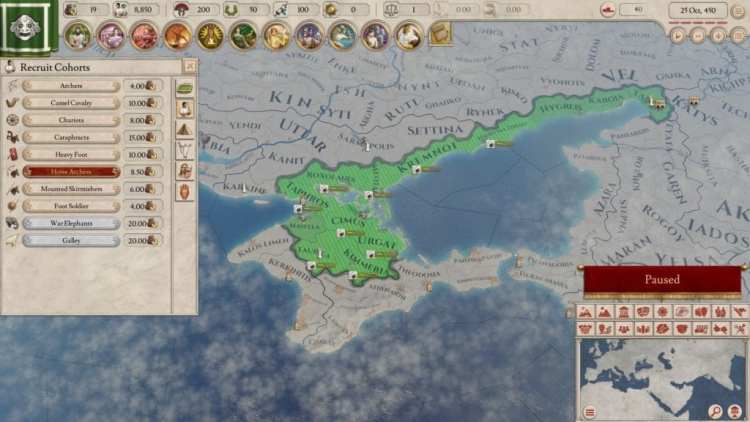
A user-friendly tool even lets you construct buildings, recruit soldiers, or convert/assimilate citizens with a few button clicks.
Et Tu, Broski?
Imperator: Rome incorporates mechanics from other Paradox titles. The aforementioned tech trees are reminiscent of Hearts of Iron’s national focus (if ideas are broadly shared among cultural groups). The population mechanic, where you can promote and assimilate different “pop” types (citizen, freedmen, tribesmen, and slaves) will remind you of Stellaris. The unique resources and the effective use of trade and surplus are somewhat reminiscent of Victoria.
One of the most notable mechanics would be your relationship with characters, as these are akin to Crusader Kings II. There are a number of events and actions that can increase or decrease character loyalty. You may also choose to imprison, banish, or execute characters just like in Paradox’s medieval masterpiece. You can even bribe or befriend them, turning consuls, chieftains, and kings into your broskis. The difference in Imperator: Rome is that there just aren’t enough quirks for character and relationship-building. It’s like ice cream minus the sweetness, or cake without the icing. Like Diet Coke, this is “Diet CK2.”
Perhaps one comparison that cannot be denied is its ties to the Europa Universalis franchise. After all, its predecessor Europa Universalis: Rome was an offshoot of the third game in the series. Imperator: Rome, therefore, is an offshoot of the fourth game, retaining similar features. Imperator is what EU: Rome would be if it grew up — but, like a confused teenager, it cannot seem to get its priorities straight. It lacks the focus and confidence on what it truly wants to be.
The Duh Is Cast
There are layers upon layers of mechanics in Imperator: Rome that you’d need to understand, sure, but it almost seems moot in practice. Only a handful will ever be necessary as you progress towards world domination.
Heavy infantry is almost always what leads to victories. Alternatively, just get a doomstack host like in other Paradox titles. Is micromanaging your populace getting annoying? Just move all the slaves and turn the rest into citizens, and watch as your research rate gets boosted sky-high.
What about revolts and civil wars? Just buy out disloyal people, banish them, or pay mercs to take care of the matter. Are scorned families suffering from loyalty hits? They don’t matter at all as long as you don’t put any of them in significant positions of power anyway. There’s very little danger of getting shafted by civil war or rebellion.
What about the numerous options on what you can do with your governor’s province? No need to bother with most of them since an extra trade route is the best option. Religion is also in the game but you’ll barely use it to convert your populace though. You’ll just use it as a once-every-five-years button-click to gain a bonus perk or increase stability easily. Hurray!
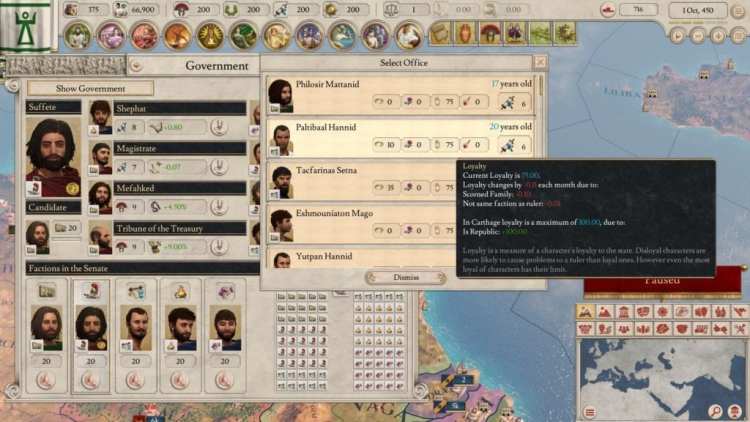
You can ignore Scorned Family interactions. You can even ignore most character interactions. The loyalty dynamics are easy to manage unless you’re Phrygia or the Seleucids which have a special event that fractures their domains.
Paint The Town Red
As for your playstyle and expansion, well, every government type almost plays the same way. Settled tribes, monarchies, and republics are all governed by a system of waiting for your “powers” — known among Paradox aficionados as “mana” — to increase up to a sufficient value before you can use certain actions.
For instance, Oratory Power is needed to Fabricate Claims before you declare war. You then steamroll your opponents with your armies. You’ll capture territory and seize forts, and then annex a province via peace negotiations. Good luck trying to find that city you need to take over a province since the negotiations screen won’t even tell you where it is. With conflict ended, you then wait for your war exhaustion, stability, and aggressive expansion (“bad boy”) to reach normal levels once more before the next war.
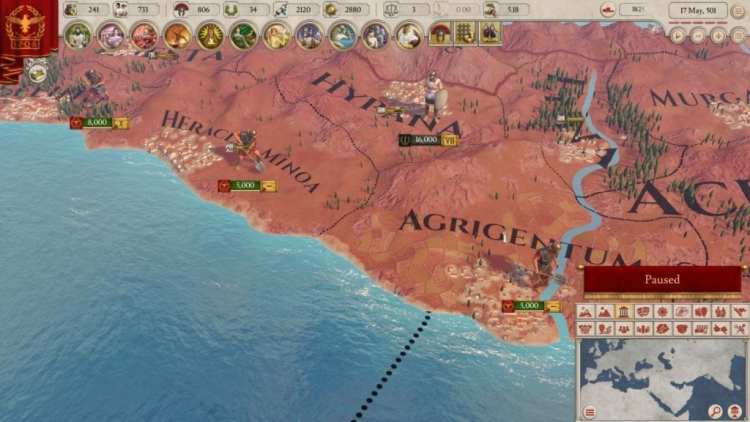
Connecting the Roman Republic via roads, one city at a time, since there’s no automation. That’s what you do during peacetime.
If you’re not going to war, you’re not really doing much. You could try to improve relationships, build an alliance network, or interact with characters, but these won’t make you think of anything else but additional points boosters.
In fact, the only playstyle that feels different is when playing as a Migratory Tribe which lets you depopulate your cities to turn your people into roving armies. You can tell all your citizens to pack up while you go on a road trip to the other side of the known world.
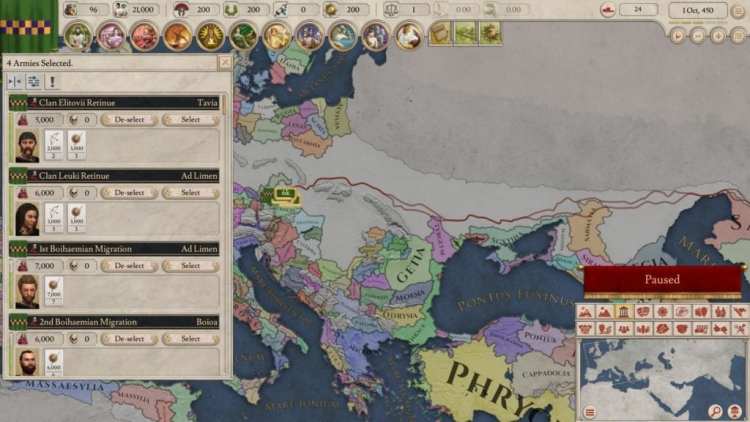
Migratory Tribes: It’s time to pack up and move on to greener pastures, everyone, all the way to the Caspian Sea!
Friends, Lend Me Your (PC’s) Gears!
Whether you’re traveling across the world, or just biding your time as you plan your neighbor’s conquest, Imperator: Rome’s campaign map would offer you some vividly striking details. Cities, monuments, rivers, forests, and mountains are all beautifully rendered. The vast landscape oozes all the pleasant aesthetics an armchair general could want from a Paradox title.
It’s just that poor performance will get in the way. Stuttering and slowdowns can and will happen, even when you’re well above the recommended specs. This is common in Paradox games given everything that goes on, but Imperator: Rome takes it to whole new levels. I actually had to switch to low preset, and even then whether it’s fullscreen or borderless windowed mode, there were times when the game ran below 20 FPS! I expected performance drops towards the late-game stages, but these were already happening the moment I unpaused the game and set the game speed to max.
One key issue could be AI scripting which can be problematic as the AI gets bogged down with numerous decisions to react to. Another could be the fact that every army in your immediate vicinity is there happily marching around. Even mercenaries are standing guard waiting for recruitment. Whatever the case, there are optimization issues that need to be addressed.
Speaking of the AI and warfare, Imperator: Rome brought back the dreaded cascading alliances and shattered retreat. The former means that wartime opponents might be joined by other nations who, in turn, become war leader — which means they can bring additional nations to the fight. From the mid-game onwards, expect wars against half a dozen nations or more. The latter means that every doomstack you encounter can escape just battered and bruised. You’re playing whack-a-mole with no end in sight until you completely obliterate them after numerous battles or once you’ve achieved peace.

As you can see via HWinfo’s overlay, there were no bottlenecks and strained or overheating GPUs. I also switched to the low preset and borderless windowed mode. Result: Below 20 FPS.
Veni. Vidi. Really?
It might seem that I’m being overly critical, and maybe I am, but that’s mostly because I’ve been extremely familiar with Paradox’s titles. I’m aware of just how engaging the company’s games are, especially for grand strategy fans. Each IP has its own strengths and weaknesses, though strengths are often highlighted.
Crusader Kings has character-building, dynasties, and roleplaying. Europa Universalis has conquest, diplomacy, and colonization. Victoria focuses on your economy and trade, while Hearts of Iron goes in-depth with modern warfare and technology. Stellaris — long criticized for being too streamlined and casual-friendly — also had moments that defined it as a 4X game set in space.
As mentioned earlier, Imperator: Rome has the traits and quirks of these titles, yet very little of the charm and uniqueness that made each title stand out on their own. It’s a jack of all trades, but a master of none. It seems that turning this into a mishmash hybrid of multiple games is actually a detriment to what it tries to be. All roads could’ve led to Rome, instead, it just went around the city in circles.
If you’re a diehard Paradox player and a grand strategy fan, you might find some enjoyment from Imperator: Rome. For the most part, though, it looks like we’ll just have to wait for future expansions or free updates to see if it’ll live up to loftier expectations.
Yes, there was a dream that was Imperator: Rome. This dream was something that came upon you in brilliant moments. You saw glimmers of inspiration from time to time. Sadly, when the time came to cross the Rubicon, that die was cast but this dream didn’t conquer. It simply faltered.

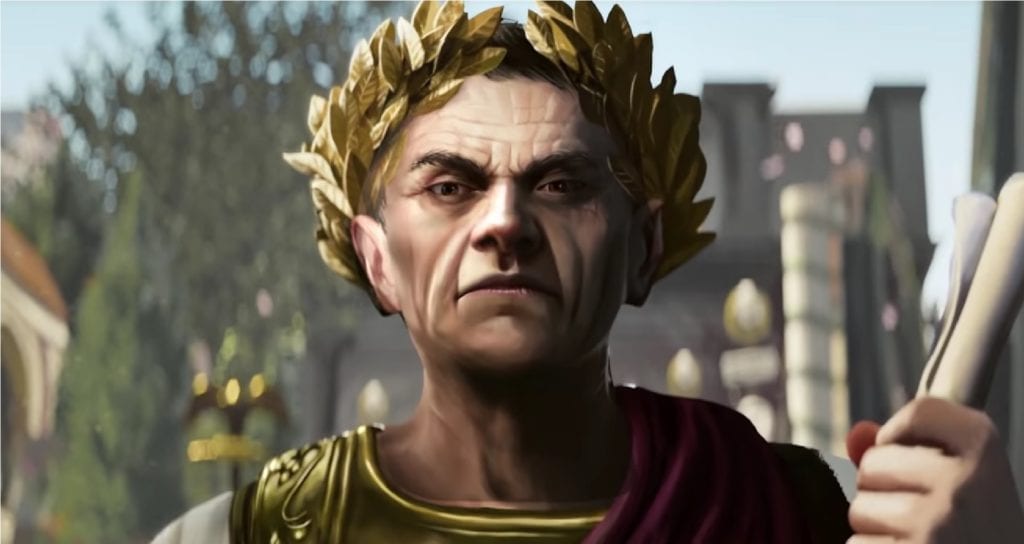
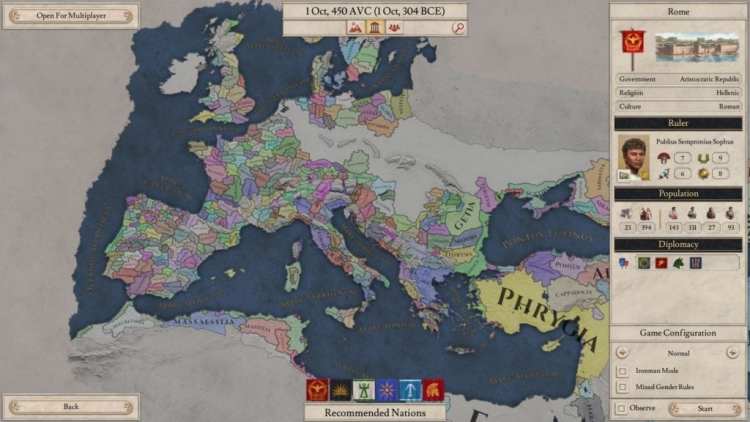
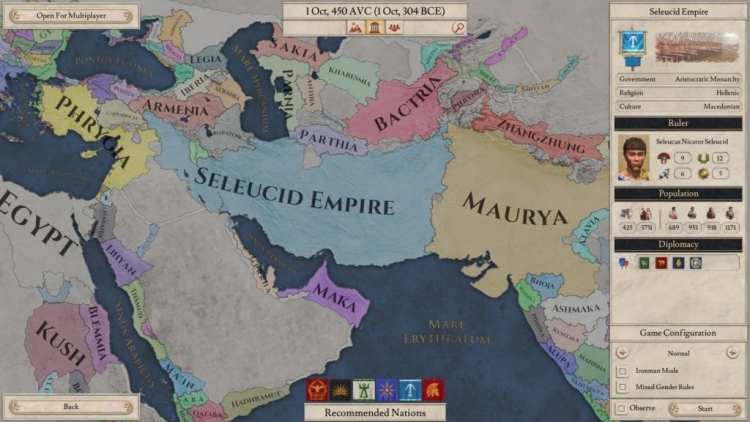
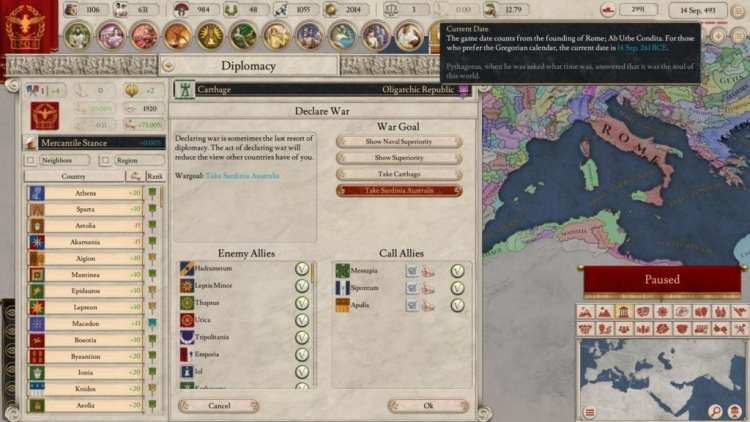





Published: Apr 25, 2019 12:00 pm